Many years ago, as a tenth grader at Malverne High School, in New York, I made the mistake of asking my English teacher, Charles Messinger, why he was forcing us to memorize Shelley’s “Ozymandias.” We were already memorizing, and reciting, much of Hamlet, and I was in the middle of preparing my lines for the spring musical he directed. The Bronx-born Messinger made short work of my complaint. “It’s better to be literate than illiterate,” he said. “You’ll thank me later.”
Mr. Messinger died three years ago, and I never did properly thank him, even though he changed my life. Soon after he died, I called my social-studies teacher, Douglas Sheer, the other teacher who changed my life. Mr. Sheer is much younger than Mr. Messinger, but I told him I wasn’t going to make the same mistake twice. Mr. Sheer had come to Malverne shortly after finishing a tour on the Marshall Islands as a Peace Corps volunteer. It was Mr. Messinger—who, along with my parents, teachers both—taught me how to use words. And it was Mr. Sheer who taught me to see the world beyond the South Shore of Long Island.
Thoughts of my teachers came to me last month, when my colleague Clint Smith, in his hometown for a book reading, tweeted the following: “On Colbert last week I mentioned my 3rd grade teacher, Ms. Mueller, who after reading a poem I wrote, told me I could be a writer when I grew up. I never forgot those words. So what an utter delight when I looked up from the signing table in New Orleans and saw Ms. Mueller there!” He attached a photo of himself and Ms. Mueller. Both are beaming, as they should be.
Today is National Teacher Appreciation Day. It seemed a good idea, at a time when teachers are under siege across America, to ask some of my colleagues, including Clint, to reflect on the teachers who made them who they are.
When teachers become too scared to teach what they are meant to teach, our democracy will be lost. We must come to understand our teachers as builders of our civilization, one child at a time. — Jeffrey Goldberg
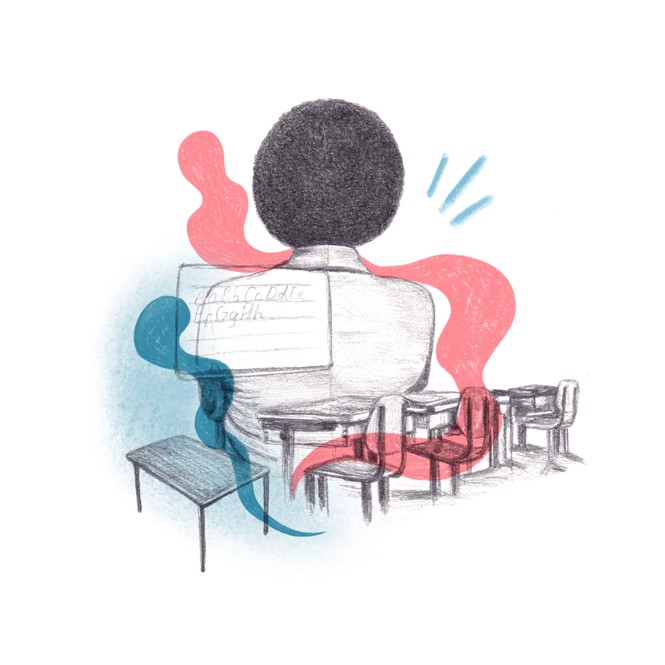
Mrs. Talbert was elegant. Sinewy and dark brown, she wore skirt suits and had a perfectly round midsize afro. Each morning, she led my preschool class in the Pledge of Allegiance and held a morning meeting. Afterward, as we fanned out to our desks, she gave instructions in a tone both caring and steely. Midday, we 4-year-olds would practice our letters, cursive and print. Because I was usually the last student to be picked up, after school she and I would restore the classroom to order in preparation for the next day. She taught me that you do what must be done. Children contributed. Seriousness—as evident in her suits and posture, and our always-tidy desks—was never coldness. In fact, Mrs. Talbert indulged me. Unlike the other teachers, she never tried to make me eat raisins or the many other foods I found revolting. One afternoon she even showed me the cabinet where all of the good snacks were hidden. I promptly shared the information with other kids.
Several times I stayed overnight with Mrs. Talbert, when my mother had to travel. I learned that her chin was slightly lifted even when she was in her housedress and slippers, with her scarf tied loosely around her afro. She hugged tightly and woke me up with gentle shoulder taps. Her table was Formica, like at a restaurant, and so clean it smelled like lemon.
I was sent up to kindergarten in the middle of the year, even though I was small and young. I remember running downstairs back to preschool each afternoon and breathlessly telling her about my days upstairs. I missed her. And I missed her much more later when we moved to Massachusetts and lost touch. My next school was progressive, informal, exceptional, and predominantly white. But Mrs. Talbert, in her classroom full of Black children in Milwaukee, a city churning with the challenges of desegregation and social movement, had laid my foundation. — Imani Perry
They called the Talented and Gifted program at Ben W. Murch Elementary School “TAG”—and I was not it. Each time a group of my first-grade classmates was assembled for an hour of “enrichment,” I was left to work on my penmanship or to do whatever the ungifted did when they had time to themselves.
It didn’t help that I was painfully shy and not terribly coordinated. That year, I shunned the eyeglasses that the optometrist said I needed, which made the blackboard indecipherable and my grades a source of shame. What I remember of that year was a feeling of drowsiness—stultifying fluorescent lights, shades drawn, a teacher with a pillowy voice.
Except for when Mary Alice Jackson, the TAG teacher, appeared. Every few weeks Mrs. Jackson would come down from the second floor to enrich the whole of our class, even those of us who hadn’t been selected for her program. Those visits felt like a James Brown concert descending on us. She moved with frenetic energy, almost athletically, and shook me back to life. She would divide us into teams to play Super Password or It’s Academic, quiz competitions she had adapted from television. Sometimes she brought a buzzer system; otherwise, we’d slap a desk and she would judge which of us answered first. Eventually, Mrs. Jackson invited me to join TAG, and it felt as if I had joined the greatest club in the world.
Everything about her class now feels a touch out-of-date. Mrs. Jackson loved knowledge—the kind that can now be summoned instantly on the phone but used to reside in encyclopedias and flash cards. This wasn’t dreary or pedantic, though it might sound like it. She wanted us to be citizens of the world and she made facts feel electrifying, because she would laugh hysterically and tease mercilessly—and because the facts were deeply meaningful to her.
Mrs. Jackson was a hugger. I’m guessing her embraces would be frowned upon these days, if not an outright violation of policy, but they mattered to me. By wrapping her arms around me, she gave me a sense of belonging that took the edge off fears. She allowed me to become myself.
Over the years, I would hear from Mrs. Jackson. Cleaning my childhood home, my mother recently found a letter that she once sent me after I published a book review in The Washington Post, our hometown paper. “Dear Squirt,” she began. “I wasn’t sure what you would amount to. But just know, I’m here and proudly watching. Here’s a dollar. Go buy yourself a Coke.” To know that she was still watching was all I wanted. — Franklin Foer
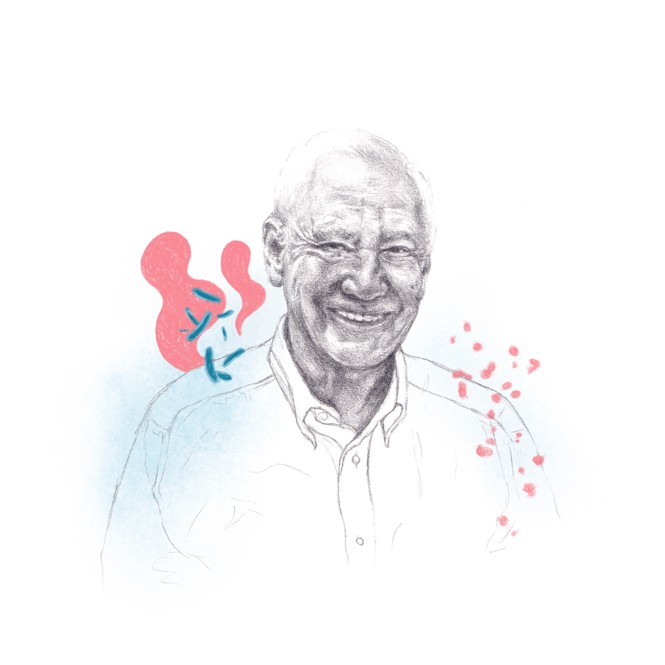
Stanley Falkow was the first person to convince me that a bacterial pathogen could be a new friend. I was an unmoored college junior when I wandered into his Introduction to Bacteriology course, expecting to learn only a bit about infectious disease. But Stan talked about microbes like each one was a pal, a character, a protagonist in its own tale; he reminded me that science was a field fueled by wonder and interrogation, rather than answers set in stone. I’d visit him in his office, and he’d tell me stories about his days running his own lab, joking crassly in his gravelly septuagenarian voice; I’d gaze at the many photographs of his golden retriever, Honey, and wonder what it would be like to conduct scientific experiments of my own.
I was at first afraid to confess this to Stan. A giant in his field, he’d spent the past half century making breakthrough after breakthrough on how bacteria passed their most dangerous genetic elements around. I, meanwhile, had no experience in science, much less bacteriology; I worried he’d laugh and tell me I was too late. But I should have known that the man who could befriend a bug would be more generous than that. It didn’t matter, he told me, that I didn’t know how to swim. I had the potential to walk on water, and so he counseled me exactly as he had generations of mentees in his lab. If science was my goal, I had to try. “Do the fucking experiment,” he told me. And so I did. — Katherine J. Wu
Nearly every day during eighth-grade English, we’d whip out some loose-leaf paper and scribble our thoughts without stopping for five, 10, or 15 minutes. These “free write” exercises could be anything: scenes, dreams, dialogue, short stories. Ms. Celano never graded them. Her goal was simply to help us establish a daily creative practice, to make us not fear writing.
As I type this right now, I can still see her classroom. To the right of the blackboard stood Ms. Celano’s own impeccably curated lending library. In addition to traditional middle-school texts, she peppered in some riskier, more advanced titles. (I recall picking up Sanyika Shakur’s Monster: The Autobiography of an L.A. Gang Member one day and not being able to put it down.) She treated us like adults, or at least like writers with promise. Ms. Celano had a way of making us feel like the distance between our daily exercises and those bound books wasn’t so large. — John Hendrickson
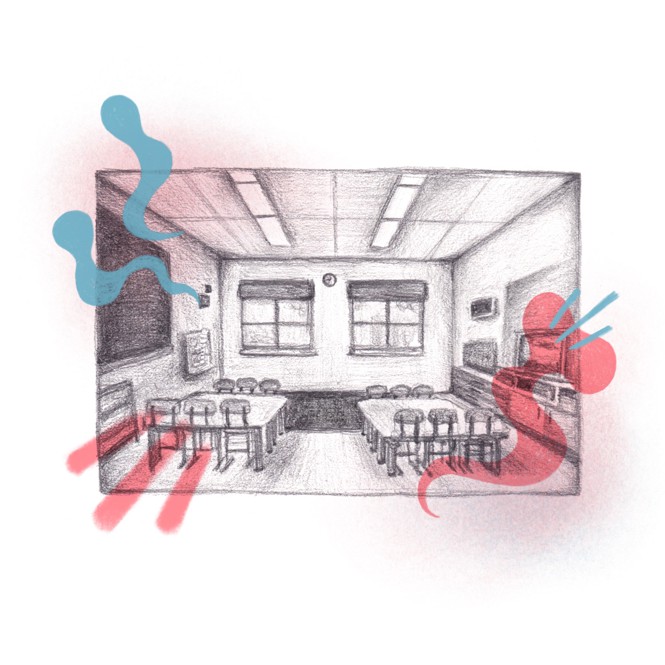
In 1968, while the adult world was blowing up, my second-grade teacher was a woman named Yvonne Prudhomme. She was the only Black teacher at Escondido Elementary—possibly in the entire Palo Alto Unified School District. Miss Prudhomme was in her mid-20s, though at 7 I had no sense of her age. She was quite beautiful, with very dark skin and hair styled like the Supremes’ circa 1965. I loved her. I don’t mean that I worshipped her as my teacher; I mean that I was in love with her in the obsessive, daydreamy way that I would later fall in love with more age-appropriate girls, but haunted by the knowledge that this love was doomed.
Nonetheless, I asked my parents if I could invite Miss Prudhomme to dinner. At our kitchen table, she informed us that she was going to leave Escondido at the end of the school year. She said that poor Black children in the neighboring district needed her more than middle-class white children in Palo Alto. My mother tried to talk Miss Prudhomme out of it, arguing that the white families in our community needed help overcoming their racial biases (a few parents had actually withdrawn their kids from her class). Miss Prudhomme was unmoved by this liberal appeal. The white kids, she said, would be fine. Rocked by her news, I didn’t think that I would be fine.
Shortly after this dinner, Martin Luther King Jr. was killed. When my parents explained why they had tears in their eyes, my first thought was how Miss Prudhomme would react. I don’t remember what she said in school the next day, but I remember sensing that the world was a big and frightening place; that I was about to lose her to it, if I hadn’t already; that the warm magic of her classroom couldn’t be sheltered from tragedy and injustice outside. This lesson was important enough to stay with me ever since, though at the time I felt only a selfish and inconsolable grief. — George Packer
Before we start, I should say that my favorite teacher is my mother, who taught biology and religious studies at my school and filled our home with copies of Reader’s Digest and encyclopedias of common medical conditions. My favorite teachers who weren’t related to me, however, were Mrs. Oliver and Mrs. Cox, who both taught English.
Although they looked very different from each other—Mrs. Cox was austere, looking out from a blunt brown fringe; Mrs. Oliver was white-haired and given to theatrical gestures—my mind has merged them into one enthusiastic, sometimes-exasperated presence. Which of them introduced me to Arthur Miller? Which of them failed to make me care about gerunds? Which of them got me to learn “Spring” by Gerard Manley Hopkins by heart? (“Thrush / Through the echoing timber does so rinse and wring / The ear, it strikes like lightnings to hear him sing.”)
They both showed me that the English language was a gift, a toy box, and an instrument that I could attempt to master. Plangent, mournful, and sad create subtly different effects; sentence lengths need to vary; semicolons are underrated. I use their lessons every day, because they did what the best teachers do. They made me want to keep learning for the rest of my life. — Helen Lewis
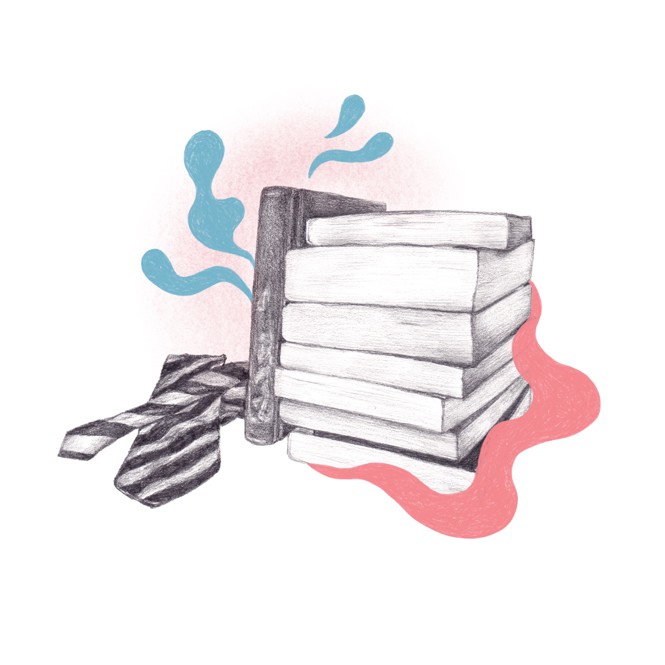
It’s easy to underestimate a classroom full of 11-year-old boys, ever on the edge of anarchy. It’s a lot harder for the boys to see the potential in themselves.
Father Martin Desmond Maiben taught English and music at St. Mary’s College, in Dublin, the school I attended in the mid-1960s. He was a Catholic priest, and for many years had been a missionary. In Dublin, his young charges wore short pants and striped ties, and with their red cheeks and unruly hair looked like inventions of the Irish tourist board. The image was deceptive. Father Maiben understood that part of his job, in truth, was managing a kennel.
And yet this was also the group of students, assembled for the first time in his music room, that he taught to sing Schubert’s An die Musik—interspersing our caterwaul with a recording of the same song by Dietrich Fischer-Dieskau. In English class, his desk stood on a dais. Every week he brought in a stack of books to lend from his own library—mostly boys’ books from the midcult comic canon of late-imperial Britain: Kipling’s Stalky & Co., Jerome’s Three Men in a Boat. As we stepped up onto the platform, he would match each of us to a volume of his choosing. In time, when I tried my hand at bits of personal writing, he took them seriously. His skill as a teacher was to make high expectations seem like a reward.
The day before my family left Ireland—we would never live there again—Father Maiben invited me to join him for an entire day walking the streets and alleys of Dublin. This was the magical, sooty city of John Banville, not the one visitors see now. And at the end of the day, he gave me Three Men in a Boat to keep. — Cullen Murphy
I was a difficult and contentious teen. One teacher changed the direction of my life by meeting me head-on: Paul Midura was wry and intellectual, an artist and an Army veteran, an adult and a man of the left who engaged my youthful conservatism with energy and seriousness but who had no compunction about snorting derisively at my adolescent overconfidence.
In a course on dystopian literature, Paul challenged me about everything, whether socialism or social conformity. He introduced me to Brave New World (years would pass before I realized what a zinger it was when he referred to me once as “Mustapha Nichols”), and then to 1984, which I devoured in two days. That book, and a new understanding of the nightmare of totalitarianism, never left me: In college I would study the Soviet Union, learn Russian, and begin a career in political science. Over the decades, we kept arguing and laughing together as we forged a friendship that became like family. But in that first year, Paul taught me never to fear criticism, that spirited arguments were about learning rather than winning or losing, and that rigor and truth—and above all, humaneness—were more important than political dogma. — Tom Nichols
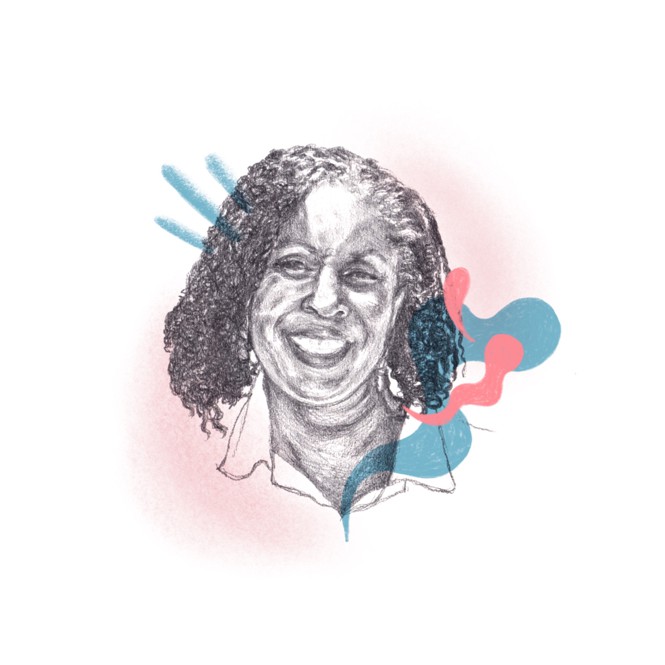
My mother was battling drug addiction. My father already had been in recovery, and he and I were in the process of repairing our estranged relationship. I was a teenager who had inherited adult problems. And I’m certain I wouldn’t have learned how to cope with them without Kathy Seabron.
Mrs. Seabron was my journalism adviser and English teacher at Mumford High School, a Detroit public school that had its share of inner-city-public-school problems: low resources, ancient textbooks, dilapidated facilities. But we also had educators like Mrs. Seabron.
She made me eager to learn about literature and language. She was patient but tough. Loving but firm. She understood that many of us came from single-parent homes, working-class families, or challenging environments, but she never let us use our circumstances as an excuse to not achieve.
Thirty-plus years later, we’re still in touch. During one particularly tough moment in my career, Mrs. Seabron sent me an email reminding me of a quote from Mahatma Gandhi: “Truth never damages a cause that is just.” As always, she knew what to say. — Jemele Hill
When I was in third grade, Ms. Mueller gave us an assignment that would change my life: She told us to select a color and write a poem about it. I selected the color gray. (Strange, I know, but I was a somber child). My poem went something like this:
I hate the color gray.
It reminds me of a rainy day.
Gray I really hate that color.
It’s annoying like my little brother.
To be clear, my brother and I have a great relationship. But at the time he was a toddler, and younger sibling toddlers can often be, well, annoying. Anyway, I remember that Ms. Mueller came over to my desk, read the poem, looked down at me and said, “Clint, that was beautiful. You could be a writer when you grow up.” For all I know she could have told the same thing to every kid in the class, but I will remember that moment for the rest of my life. She planted something inside of me that made it possible to imagine a life of writing poems. You never know how something you say—even an offhand comment—is going to stay with a student. — Clint Smith